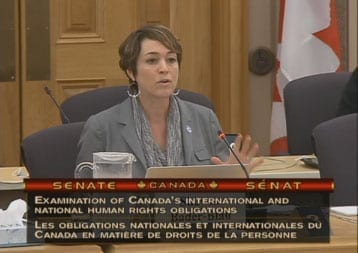The global economy generally is unregulated and the system encourages multinational corporations to operate or source from countries where wages are low, laws to protect human rights are few or unenforced and workers are impoverished and vulnerable, Shawna Bader-Blau, Solidarity Center executive director, said before the Canadian Parliament Monday.
“Unfortunately, the horrifying working conditions that led to the Rana Plaza collapse and the deadly Tazreen Fashions fire just six months prior are not unique to Bangladesh. In developing countries around the world, we see building codes go unenforced, and health and safety standards ignored,” Bader-Blau told the Senate Standing Committee on Human Rights.
The Canadian Senate committee held the hearing, “Corporate Social Responsibility and Garment Workers,” to monitor human rights issues and to review how the Canadian government addresses its international and national human rights obligations.
Bader-Blau emphasized that improving workplace conditions above all requires involving working people in the process—and that means workers must be able to form unions and bargain over their wages and working conditions with employers.
She recommended several steps to address the growing global crisis in which low wages, few jobs and exploitative working conditions increasingly becomes the norm. Governments “have important tools to improve human rights conditions for workers, including trade arrangements and legal requirements for accountability in supply chains,” she said.
Further, global corporations must support the human rights of their workers. As a start, global corporations should “fully embrace the United Nations guiding principles on business and human rights as a floor and aggressively move their implementation across the supply chain,” Bader-Blau said.
“Treat human rights with a level of priority you treat pricing and quality control. Global corporations have figured out how quality control can be maintained across their supply chain. How about worker rights?”
The bottom line, she said, is that no amount of legally unenforceable, nicely worded social-responsibility promises is ever going to resolve the abuses perpetuated on a vulnerable workforce.
“Rather, workers’ ability to organize and collectively raise concerns to management because they have the strength of a union is the only realistic approach to ensuring that they know and can exercise their rights. Without a union, individuals who complain can be threatened, fired or even killed into silence. Together, they are a force for improvement.”
Others testifying before the committee included Shannon Brown, Fairtrade Canada Business Development and Commercial Relations director; Sofia Molina, Fairtrade Canada category specialist for coffee; and Bob Jeffcott, co-founder and policy analyst for the Maquila Solidarity Network.
See Bader-Blau’s full testimony, starting at 77:55.

